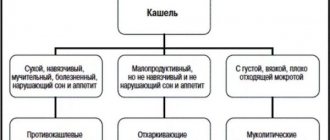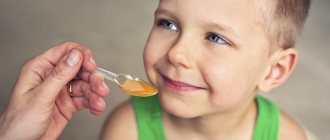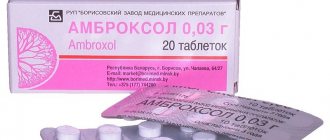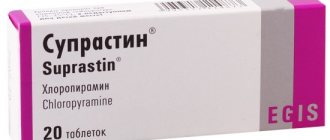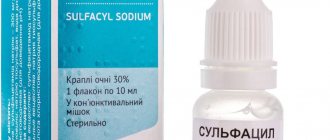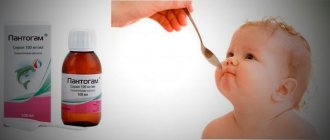Cough › Cough treatment › Medicines › Cough syrup for children under 1 year
Cough syrup for children under one year old helps to significantly alleviate the symptoms of the disease. After all, coughing is especially painful for young patients, because their immunity is still poorly coping with infectious lesions, and it is harmful for the body to take potent drugs - they cause many side effects. When a cough develops in a child under 1 year of age, parents are sometimes ready to do anything to help the baby and eliminate the unpleasant condition.
Medicinal cough syrups
The most optimal dosage form for children under one year of age is syrup.
Advantages of using syrups in children of the first years of life:
- the intake of drug components through the mouth is physiological and painless;
- parents do not have difficulties with dosage;
- the syrup has a pleasant taste and smell, infants usually drink it willingly.
The doctor prescribes cough syrup for children under one year of age strictly individually.
There are different types of cough:
- according to the time and intensity of the process - acute, chronic, protracted, recurrent;
- in strength and depth - coughing and deep cough;
- by the nature and degree of sputum discharge - dry (unproductive) and wet (productive);
- by sound - hoarse, vibrating, barking, silent;
- for a reason - caused by stress, an infectious or allergic process, the entry of a foreign body into the respiratory tract and other factors.
It's easy for parents to get confused in the modern arsenal of cough syrups.
In the instructions for the medicine, the manufacturer always indicates the active substance in the “composition of the syrup” section.
Classification of syrups
| Types of syrups | Mechanism of action | Indications for use | Active substance | Examples of syrups |
| Mucolytic | Act directly on mucus, liquefy it, and facilitate expulsion | Conditions in which sputum discharge is difficult | Bromhexine hydrochloride, Ambroclol hydrochloride, Acetylcysteine, Carbocysteine | "Ambroxol", "Lazolvan", "ACC", "Bronhoklar", "Ambrobene", "Ambrohexal", "Fluditek" |
| Antitussives | Suppress the cough reflex by affecting the cough center or cough receptors of the breathing tube | If you need to suppress a cough | Peripheral action: Phenoxdiazine, Prenoxdiazine. Central action: Codeine + Ipecac, Ethylmorphine hydrochloride, Dextromethorphan hydrobromide - with a narcotic effect. Glaucine hydrobromide, Citrate butamirate, Oxeladine citrate - non-narcotic | "Glauvent" "Neo-Codion for children", "Dextrometrophan, cough syrup", "Glycodin" "Butamirat", "Sinekod", "Paxeladin" |
| Expectorants | They increase the amount of mucus secreted and “facilitate” its evacuation from the respiratory tract | Unproductive cough, sputum is produced, but “stagnates” in the respiratory tract | Thyme extract, ivy leaf extract, plantain extract, licorice root extract - plant origin. Potassium iodide, Sodium iodide, Sodium bicarbonate – resorptive action | “Prospan”, “Gedelix”, “Doctor Theis”, “Bronchicum”. “Gerbion”, “Alteyka”, “Licorice root syrup”, “Eucabal” “Potassium iodide syrup”, “Cough medicine for children” "Mukaltin" |
| Combined | They simultaneously influence several links in the pathogenesis of the disease | Diseases when cough is accompanied by other symptoms | Several active ingredients, including those from other pharmacological groups | "Bronholitin" "Ascoril", "Joseth". “Bronchoton”, “Doctor MOM”, “Bronchipret”, “Holpex anti-cold syrup” |
There is no most effective syrup. No medicine can cure instantly. Sometimes, in the process of treating a cough, the doctor replaces the child’s medications, selecting the one that will bring maximum benefit to the child at a certain stage of the disease.
Which syrup to choose according to the disease
- When laryngitis develops, in order to eliminate soreness and inflammation of the larynx, whistling when breathing, swelling of the vocal cords, and cough up pathogenic mucus, you should use syrups from medicinal herbs.
- When tracheitis develops, Sinecod syrup is used to relieve inflammation and treat a sharp cough, which often occurs at night, which suppresses the cough reflex. Its advantage is that even in children under one year old it does not in any way affect the functioning of the intestines and stomach. It also contains no addictive components. Sinekod will make your baby's breathing easier and expand his bronchi.
- If a child develops bronchitis, he begins to be very capricious and becomes lethargic. The nose is stuffy, the child constantly wants to sleep, suffers from a dry cough, which needs to be converted into a wet one. The syrup, which is based on breast milk, works well.
It is necessary to treat bronchitis in the early stages in order to prevent the addition of a bacterial infection and additional complications.
This will require antibiotics. If bronchitis becomes chronic, then there is a risk of severe depletion of the bronchial walls and the development of asthma. Doctors usually prescribe Herbion syrup with plantain for treatment; it is completely safe.
Herbion envelops the mucous membrane of the larynx and softens inflammation, which subsequently recedes and at the same time strengthens the immune system. The drug also helps with the appearance of viscous green mucus when coughing.
Mucolytic drugs
Indications for the use of mucolytics (secretolytic agents) are conditions when the sputum is very viscous, “clogs” the airways, and the baby cannot cough it up on his own. This children's cough syrup effectively thins the secretions of the respiratory tract without increasing the amount of phlegm.
Prescribed to children under one year of age with acute and chronic bronchitis, pneumonia, bronchial asthma, and with breathing disorders in the neonatal period.
What syrups are best for children under one year of age?
- Ambroxol. From the first month of life, children are allowed to give Ambroxol for cough 2.5 mg, 2 times a day, but not longer than 5 days in a row. In this case, the child needs to drink more water.
- Ambrobene. Syrup is also acceptable, the dose for children is 2.5 mg in the morning and evening.
- Gedelix. You can give half a teaspoon of syrup diluted in water per day. You need to drink a lot at the same time.
- Prospan - also drink half a teaspoon 2 times a day, but not longer than 7 days.
- Flavamed - cough syrup for newborns, give half a measuring spoon 2 times a day for five days.
All of the above remedies help relieve cough in children from birth during its development, as well as at 2, 3, 4 months and older.
Starting from six months, you can treat with other syrups:
- Lazolvan – half a teaspoon in the morning and before bed.
- Bronchicum - it can be treated for 2 weeks without a break - half a teaspoon before breakfast and before bed.
- Linkas – take half a teaspoon just once a day, and therapy can be carried out for up to 10 days.
- Cough syrup for children based on licorice root - 2 drops should be dissolved in a teaspoon of boiled water and taken 3 times a day for 10 days.
Starting from 7 months, Eucabal is well suited for treatment - a teaspoon once a day.
Antitussives
Sometimes a cough is “useless”, there is no point in coughing up sputum; during attacks of spasmodic cough, the doctor may prescribe a drug from the group of antitussives.
This principle of treatment is symptomatic. In this case, the medicine does not act on the cause of the disease, but suppresses the symptom. Syrups will eliminate a dry, painful cough, provide an opportunity to sleep peacefully and gain strength to fight the disease, prevent the development of complications, and improve the quality of life.
There are antitussives:
- peripheral action - reduce the sensitivity of cough receptors in the respiratory tract;
- central action - inhibit excitation in the cough center of the medulla oblongata.
Some centrally acting drugs may have a narcotic effect (used in children only in emergency cases).
It is possible to prescribe antitussives for whooping cough, bronchial asthma, in the postoperative period, and for diseases of the upper respiratory tract.
Therapy methods
The treatment regimen should be completely based on the type of cough. A dry cough is the most dangerous and indicates the initial stage of the inflammatory process. With a dry cough, phlegm does not come out, but mucolytic drugs designed to reduce the viscosity of mucus help this process. Syrup for a child under one year old should have a pleasant, neutral taste and have a mild therapeutic effect on the body. It is desirable that the composition of the product does not contain components that can cause allergies.
A wet cough is much easier to treat than a dry cough. In order to help the newborn get rid of mucus accumulated in the body, expectorants and thinners are used. It is difficult for a newborn to cough up mucus on his own due to weak muscles, so he needs help with a vibration massage. Also, to speed up the process, doctors often recommend using inhalations and warming procedures.
Expectorants
In some conditions, in order for a child to recover quickly, there is a need to increase sputum production and speed up its elimination. In this case, expectorant syrups “come to the rescue.”
They may relate to herbal medicine - contain plant components or have a resorptive type of action. Drugs in this group promote rapid clearance of the contents of the bronchopulmonary tract, acting directly on the epithelium of the bronchial mucosa.
Prescribed for the treatment of laryngitis, tracheitis, pneumonia, bronchitis.
Ambrobene
The drug Ambrobene can eliminate dry cough in newborns in the first year of life. This is a mucolytic agent, the basis of which is ambroxol. The drug is available in different forms, but syrup is used to treat children under one year of age. Ambrobene copes well with diseases such as:
- laryngitis;
- tracheitis;
- bronchitis;
- pneumonia;
- attacks of bronchial asthma.
Therefore, it is used quite often to treat cough in young children.
Combination drugs
Any disease is a collection of symptoms, and cough is one of them. It is impossible to cure the body by acting on only one part of the disease.
Therefore, manufacturers produce syrups that contain several medicinal substances. The action of each individual component is enhanced and complemented. Medicines in combined syrups “help each other.”
An example would be:
- “Bronholitin”, “Bronchoton” - contain a non-narcotic antitussive of central action and a drug to relieve spasm of bronchial smooth muscles.
- “Ascoril”, “Joset” - a combination of a mucolytic and a bronchodilator.
- “Bronchipret”, “Doctor MOM” - a combination of herbal medicines.
- "Holpex anti-cold syrup" - includes substances with mucolytic, antiallergic, anti-inflammatory active ingredients.
Contraindications to the use of syrups
Contraindications may be due to:
- The active substance is intolerance to a drug or disease, when the harm from this drug exceeds the benefit from its prescription.
- General condition - the child may be weakened by illness and not have the strength to swallow.
- Taste preferences - if the baby hates raspberries, and for this reason it is impossible to force him to drink medicine with raspberry flavor.
- Excipients - for example, the syrup contains corn starch, and the child is allergic to corn.
Therefore, it is important to pay attention in the instructions not only to the indications for use, but also to the composition of the syrup.
Linkas
Not all cough remedies can be given to young children. The least harmful to the body of a newborn is a drug made from plants. One of this category is Linkas syrup - a unique remedy with mucolytic and anti-inflammatory properties. This syrup contains ingredients such as fragrant violet flowers, anise, hyssop leaves, licorice root, marshmallow flowers, broadleaf cordia fruits, etc.
Linkas in syrup, based on the instructions for use, is used to treat infectious and inflammatory processes that occur in the respiratory system: cough, ARVI, influenza, pneumonia, bronchitis, pharyngitis.
Features of use for children under one year old
Pediatricians like to repeat that a baby is not a miniature version of an adult. The child has different anatomical and physiological characteristics. His small bronchi are narrower, which makes it difficult for him to discharge sputum. The serous membrane of the lungs (pleura) is loose and relatively thick. This contributes to a more rapid development of inflammatory processes in it. Premature newborns have immature lungs.
A baby’s kidneys work at a “different speed” than an adult’s kidneys. The liver is not mature enough to neutralize toxins. Consequently, the removal of the drug from the body will occur according to completely different laws than in an adult. The child is in a greater “risk zone” in case of an overdose of the drug.


